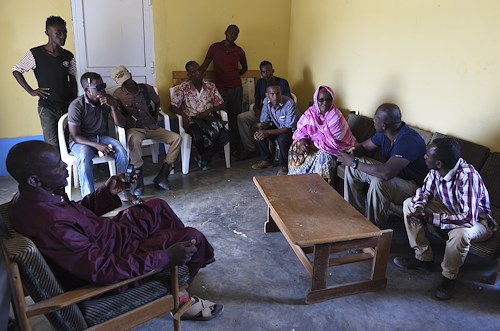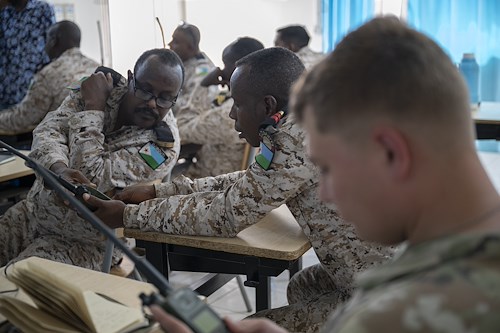Gallery contains 8 images
×
Photo 1 of 8
Civil Affairs Team assesses violent extremism threats, utilize partnerships to accomplish mission
U.S. Army Capt. Timothy Samms, 411th Civil Affairs Battalion, Bravo Company, Civil Affairs Team 3 officer-in-charge, converses with residents of the village of Holhol, Djibouti during a key leader engagement, May 18, 2017. Supporting Combined Joint Task Force- Horn of Africa’s efforts to assist the region in furthering security and stability, key leader engagements are essential to establish relationships with African partners and are built on trust, dependability, and shared security interests. (U.S. Air Force Photo by Eboni Prince)
Photo by: Staff Sgt. Eboni Prince
Photo 2 of 8
Civil Affairs Team assesses violent extremism threats, utilize partnerships to accomplish mission
U.S. Army Master Sgt. Roberto Roig and Spc. Andre Spence, both assigned to 411th Civil Affairs Battalion, Bravo Company, cross rocky terrain as they approach the village of Holhol, Djibouti, May 18, 2017. The 411th Civil Affairs Battalion, Bravo Company, Civil Affairs Team 3, travelled to the village to conduct a counter-violent-extremism assessment in support of the Combined Joint Task Force- Horn of Africa’s effort to neutralize violent extremist organizations and achieve a stable, secure environment in East Africa. (U.S. Air Force Photo by Eboni Prince)
Photo by: Staff Sgt. Eboni Prince
Photo 3 of 8
Civil Affairs Team assesses violent extremism threats, utilize partnerships to accomplish mission
Kamil Mohamed, a language interpreter, communicates a message to U.S. Army Capt. Timothy Samms, 411th Civil Affairs Battalion, Bravo Company, Civil Affairs Team 3 officer-in-charge, during a key leader engagement in Holhol, Djibouti, May 18, 2017. Supporting Combined Joint Task Force- Horn of Africa’s efforts to assist the region in furthering security and stability, key leader engagements are essential to establish relationships with African partners and are built on trust, dependability, and shared security interests. (U.S. Air Force Photo by Eboni Prince)
Photo by: Staff Sgt. Eboni Prince
Photo 4 of 8
Civil Affairs Team assesses violent extremism threats, utilize partnerships to accomplish mission
U.S. Service members from the Combined Joint Task Force-Horn of Africa meet and mingle with residents of the village of Holhol, Djibouti, May 18, 2017. The 411th Civil Affairs Battalion, Bravo Company, Civil Affairs Team 3, travelled to the village of Holhol to conduct a counter-violent-extremism assessment in support of the Combined Joint Task Force- Horn of Africa’s effort to neutralize violent extremist organizations and create a stable, secure environment in East Africa (U.S. Air Force Photo by Eboni Prince)
Photo by: Staff Sgt. Eboni Prince
Photo 5 of 8
Civil Affairs Team assesses violent extremism threats, utilize partnerships to accomplish mission
Fatouma Omar Guedi, a language interpreter, plays a game with several children in the village of Holhol, Djibouti, May 18, 2017. Language interpreters are essential to the success of civil affairs operations and act as liaisons between the military personnel and local key leaders in the east Africa region. (U.S. Air Force Photo by Eboni Prince)
Photo by: Staff Sgt. Eboni Prince
Photo 6 of 8
Civil Affairs Team assesses violent extremism threats, utilize partnerships to accomplish mission
U.S. Army Sgt. Grady Kissee and Sgt. Robert Hawkins, both assigned to the Combined Joint Task Force-Horn of Africa, Military Information Support Operations, play soccer with children in the village of Holhol, Djibouti, May 18, 2017. Tactical Psychological Operations team members travelled with the 411th Civil Affairs Battalion, Bravo Company, Civil Affairs Team 3, to the village of Holhol to conduct a counter violent extremism assessment in support of the Combined Joint Task Force- Horn of Africa’s effort to neutralize violent extremist organizations to create a stable, secure environment in East Africa. (U.S. Air Force Photo by Eboni Prince)
Photo by: Staff Sgt. Eboni Prince
Photo 7 of 8
Civil Affairs Team assesses violent extremism threats, utilize partnerships to accomplish mission
Children pose for a picture in Holhol, Djibouti, May 18, 2017. The 411th Civil Affairs Battalion, Bravo Company, Civil Affairs Team 3, travelled to the village of Holhol to conduct a counter-violent-extremism assessment in support of the Combined Joint Task Force- Horn of Africa’s effort to neutralize violent extremist organizations in the region to create a stable, secure environment in East Africa. (U.S. Air Force Photo by Eboni Prince)
Photo by: Staff Sgt. Eboni Prince
Photo 8 of 8
Civil Affairs Team assesses violent extremism threats, utilize partnerships to accomplish mission
A child tosses a ball with Fatouma Omar Guedi, a language interpreter, in the village of Holhol, Djibouti, May 18, 2017. Language interpreters are essential to the success of civil affairs operations and act as liaisons between the military personnel and local key leaders in the Horn-of-Africa nations. (U.S. Air Force Photo by Eboni Prince)
Photo by: Staff Sgt. Eboni Prince
CAMP LEMONNIER, Djibouti-- While singing along to the sounds of The Jackson 5 hit song, “Blame it on the Boogie,” snacks are being eaten and shared among the passengers of the boxy sport utility vehicle.
U.S. Army Master Sgt. Roberto Roig and Spc. Taylor Robinson, both assigned to the 411th Civil Affairs Battalion, Bravo Company, Civil Affairs Team 3, joke about the previous days events, bracing themselves for each bump in road as they cross the rocky terrain.
It feels like any other road trip; but this one has a vital purpose.
As the team arrives at their destination, the music is turned off, game faces are on and it’s go time.
Transnational threats and violent extremist organizations endanger the safety and stability of Africa. So, the work Civil Affairs Team 3 members do to counter these threats is in the common interest of both the U.S. and the Horn of Africa nations.
The team, primarily comprised of five members, has a mission to assess violent extremism and civil reconnaissance in austere locations throughout Djibouti.
“We analyze the thought process of what makes cultures from outside Djibouti do what they do versus what makes living in Djibouti so different,” explained Roig. “Our goal is to find out what the drivers of instability are that may trigger other cultures to become part of a group of violent extremists.”
The combination of regional expertise, political-military awareness and professional military skills are conducive in civil affairs operations like the key leader engagement CAT 3 held in the village of Holhol, Djibouti on May 18.
On a hot, humid day with temperatures reaching above 100 degrees, CAT 3 met with the village’s Sous Prefét, Mahdi Adam, to discuss the concerns of the community, assess the atmosphere and evaluate what, if any, assistance Combined Joint Task Force-Horn Of Africa can provide. Specifically, the team brought specialists to evaluate the town’s capability for farming the land and potentially cultivating honey from their plentiful bee population.
This meeting is critical in laying the groundwork of rapport from which the CAT 3 can build upon through future visits.
“Each key leader engagement is crucial to building a working relationship with the local populace,” said U.S. Army Sgt. Tito West, 411th Civil Affairs Battalion, Bravo Company, Civil Affairs Team 3. “Interacting with the locals shows that we are personable. Through this, the foundation of a trusting relationship begins to form and opens the door to understanding how and why people do what they do.”
Holhol, the seventh largest city in Djibouti, has a population of more than 3,000 people, mostly of Issa Somali descent. The variance in origins between U.S. service members and the residents of Holhol lends to the need for cross-cultural communications. To aid in this, language interpreters fluent in the dialects spoken in the Djiboutian regions, accompany CAT 3 on their exploits.
Aside from assisting with conversational fluidity, the interpreters have proven to be a valuable resource for planning and ultimately, the success of the missions.
“Without [interpreters], we would not be able to make contact with any key leaders,” said Roig. “They also keep us updated on things that occur in our area of operations that are important to our mission, like washed out roads, overturned trucks, or if there are celebrations or religious events going on that we need to know about.”
Roid expounded further.
“There are many cultural challenges we face on every counter violent extremism assessment or KLE, but with a combination of previous experiences, training and the guidance that our interpreters provide we are able to remain situationally aware,” said Roig.
Without the support of local East African partners, many of the tasks CAT 3 attempts would be difficult. For this reason, they work closely with the leaders of various communities to facilitate access to conduct missions that work toward the mutual security goals in Africa.
“Everything we do, from engaging key leaders to playing games with and providing entertainment for the youth in the town, is essential because it all works for the greater good of helping African nations, like Djibouti, provide for their own security and well-being,” said West. “Simultaneously, our operations also prevent violent extremist organizations from threatening America, which ensures the American people and their best interests are shielded from harm.”




























